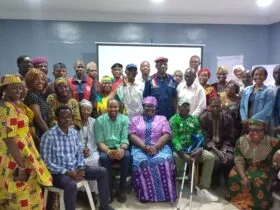Christian Aid, a non-governmental organization, has trained journalists and members of Local Emergency Management Committees (LEMCs) on crisis communication to strengthen early warning systems and reduce the risks of flooding.
The three-day workshop, titled “Crisis Communication for Disaster Risk Reduction,” was organized in collaboration with UNICEF, the European Union, and the Kaduna State Emergency Management Agency.
Speaking at the close of the training on Friday, Mr. Michael Agboh, the program officer for Christian Aid, said the exercise equipped participants with the tools to deliver timely and effective disaster messages, particularly regarding floods. The training included participants from Civil Society Organizations (CSOs), SEMA, and media practitioners from the Kaduna North and Chikun Local Government Areas.
He said the organisation considered crisis communication as a life-saving tool, stating that disasters often escalate because vital information does not reach vulnerable communities on time.
“Flooding causes alarming damage to lives and property, but with proper community engagement and early warning messages, risks can be greatly reduced,” he said.
Agboh explained that the training was deliberately structured to bridge the gap between experts and communities, enabling journalists and LEMCs to translate technical information into simple, actionable messages.
According to him, blocked drainages and poor waste disposal practices were major human-induced factors aggravating flood risks in Kaduna and across Nigeria.
Agboh said, “Citizens must take responsibility by changing negative behaviours instead of waiting for government alone. Protecting communities from floods requires everyone’s effort.”
He added that Christian Aid would continue to support platforms that promote disaster preparedness, resilience, and community driven solutions in Northern Nigeria.

Ms Jacqueline Adebija, Communications Specialist and Lead Facilitator, said the workshop aimed to strengthen collaboration between journalists, emergency managers and community structures in disaster response.
According to her, effective communication is central to disaster preparedness, as poorly delivered messages often undermine early warning systems.
“We deliberately examined communication theories and tailored them to our local context because what works globally must be adapted to realities in Northern Nigeria,” Adebija explained.
She said the sessions guided the participants on message development, audience analysis and persuasive communication strategies to influence behavioural change.
“The idea is not just to inform people but to persuade them to act, whether by moving to safer grounds during floods or by stopping indiscriminate dumping of waste,” she said.
Adebija added that the training also stressed synergy among media, CSOs and LEMCs to ensure unified voices in disaster messaging for greater impact



